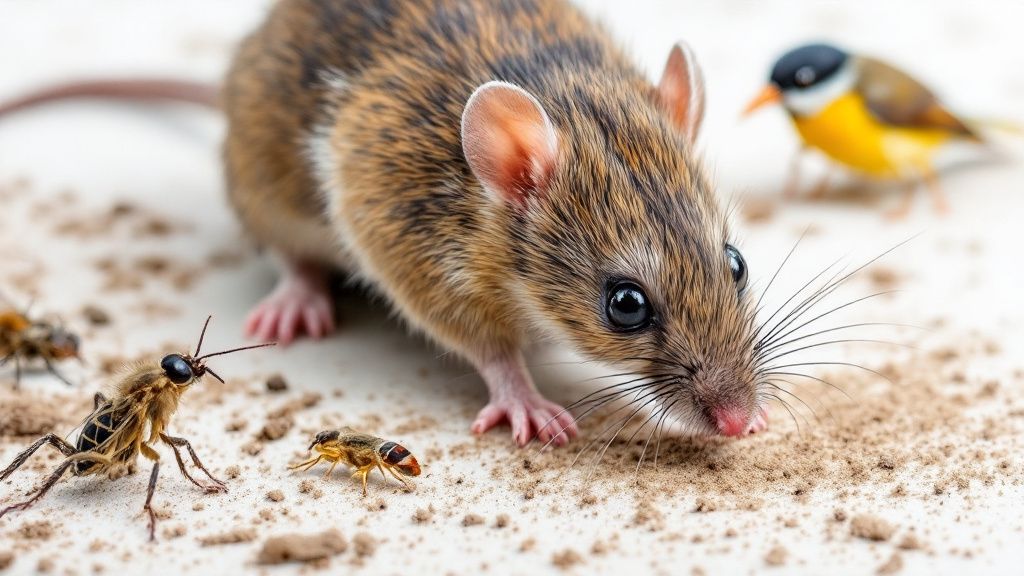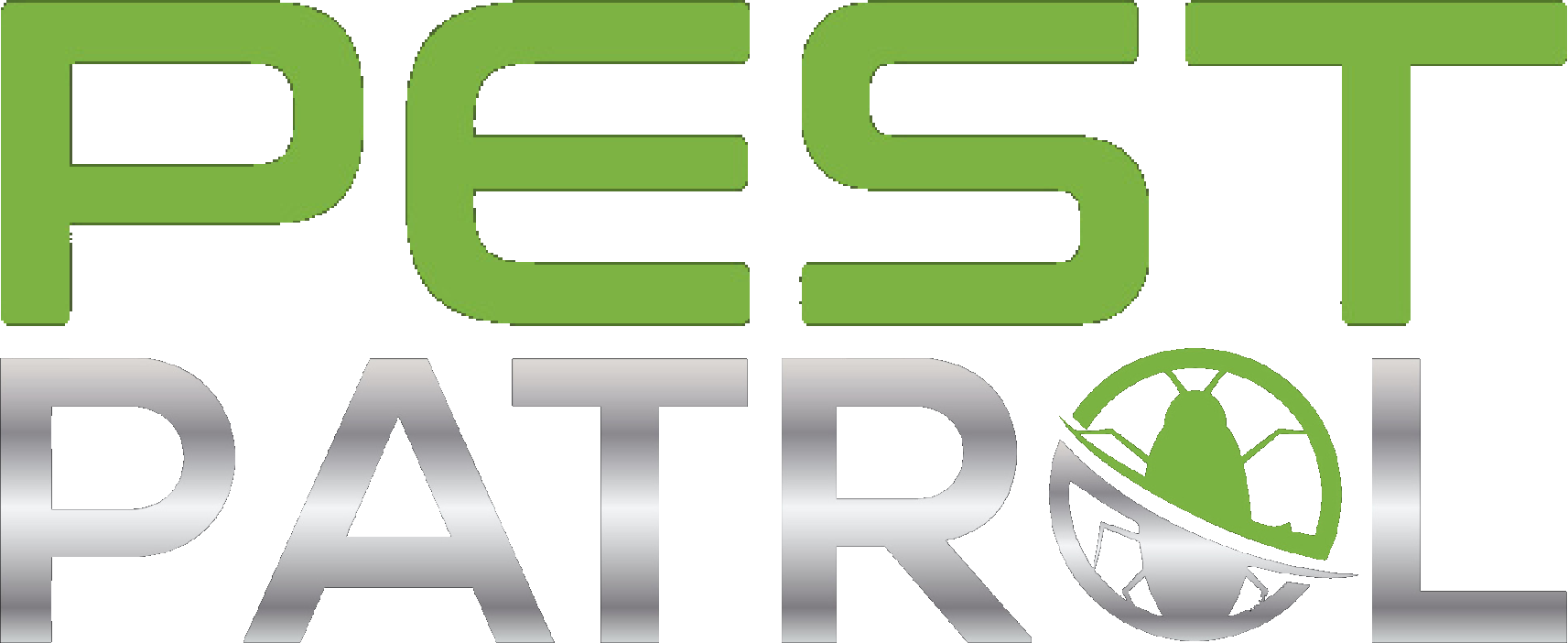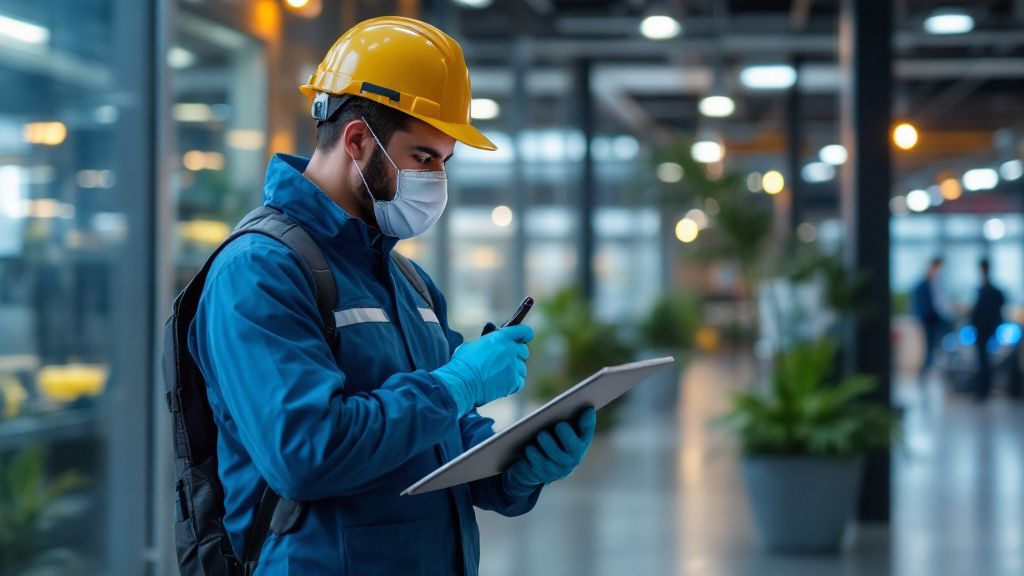Navigating pest control in commercial environments demands a tailored approach, as these spaces present unique challenges. You can begin mastering commercial pest control by recognizing the significance of a thorough pest control inspection. Identifying potential pest entry points is crucial, as even the smallest openings can invite infestations. Collaborating with local pest control experts can provide insights into effective pest management strategies. They offer affordable pest control solutions tailored to your needs, ensuring minimal disruption to your business operations. Especially in emergencies, having access to emergency pest control services can prevent severe infestations. It’s essential to consider commercial pest control costs; investing in preventive measures often saves money in the long run. Consistent education through pest control tips can also equip you with vital knowledge to maintain a pest-free environment efficiently.

Understanding the Importance of Commercial Pest Control
Commercial pest control holds critical importance as it safeguards your business from the disruption and damage pests can inflict. Pests in commercial spaces can compromise hygiene standards, lead to inventory losses, and harm your business’s reputation. By prioritizing pest control, you protect your business’s operations, ensuring a safe and clean environment for your customers and employees alike. Reliable pest management can prevent costly damage and enhance customer trust.
On one hand, some business owners view commercial pest control as an unnecessary expense, believing their establishment is immune to pests. On the other hand, many experts argue that investing in commercial pest control services is not only preventive but also a cost-effective measure in the long run. Effective pest management solutions can save significant expenses by preventing infestations before they become serious issues, proving the value of proactive measures.
Exploring affordable pest control options is essential when considering cost management. By working with local pest control experts, you gain access to specialized knowledge tailored to your specific needs. They provide affordable yet comprehensive pest control solutions that align with your budget. A pest control inspection will help determine the most effective strategies tailored to your commercial space, offering a customized approach for pest prevention.
In emergency pest control situations, having a ready plan is crucial for controlling and mitigating infestations swiftly. Being prepared with expert guidance ensures you can handle any pest-related emergencies efficiently. Pest control tips provided by professionals can equip you with valuable insights for maintaining ongoing pest prevention measures, ensuring long-term protection for your commercial establishment.

Identifying Common Pests in Commercial Properties
In commercial properties, identifying common pests is crucial for effective pest control solutions. The most prevalent pests include rodents, cockroaches, ants, and flies, each posing unique challenges. Rodents are notorious for damaging structures and contaminating food products, while cockroaches can trigger allergies. Regular pest control inspections are essential for early detection before these pests establish colonies, disrupting your business operations and impacting health standards.
The current state of pest infestations in commercial spaces shows a trend towards increasing resistance to conventional treatments. This calls for innovative pest management strategies that adapt to changing pest behaviors and resistance patterns. By analyzing these trends, local pest control experts can develop more targeted approaches, ensuring pest control remains effective in combating new or resilient pest species.
Engaging commercial pest control services helps in maintaining a pest-free environment. Pest control tips from professionals can equip you with knowledge on preventive measures, like proper sanitation and waste management. Understanding pest patterns and behaviors solidifies your defense against infestations. Considering the commercial pest control cost, investing in regular maintenance and updates can save substantial resources by preventing more severe infestations, ensuring the longevity and safety of your property.

Choosing the Right Pest Control Service
Selecting the right pest control service is pivotal for effective pest management in commercial settings. Begin by researching and identifying local pest control experts who have a strong reputation and proven track record. Ensure they offer tailored pest control solutions that fit your specific needs. Equally important is assessing whether their services include emergency pest control, as quick responses are critical in curbing sudden infestations.
One of the most frequently asked questions about commercial pest control services is how to balance effectiveness with cost. Here’s the answer: look for services offering comprehensive packages that outline clear pest control plans, including preventive measures and emergency responses. Understanding commercial pest control costs involves evaluating the long-term benefits of prevention versus the expenses incurred from severe infestations. Choosing a service that prioritizes preventive strategies can save on future expenses.
Another factor to consider is whether the pest control service includes regular pest control inspections and ongoing updates on new pest control tips and strategies. This ensures that the methods used remain relevant and effective against emerging pest threats. Engaging a company that prioritizes education and adaptation helps maintain a pest-free environment, promoting continuous safety and cleanliness in your business premises.
Integrated Pest Management Strategies
Integrated Pest Management (IPM) strategies are an effective way to address pest control in commercial spaces by emphasizing prevention and sustainability. This approach involves understanding pest behavior and using a combination of biological, physical, and chemical control methods to manage infestations. Engaging local pest control experts to implement IPM can provide you with tailored solutions that minimize environmental impact, ensuring a balanced approach to pest control.
Looking at Integrated Pest Management through the lens of sustainability, we can see that it promotes long-term pest control solutions that integrate seamlessly with your business operations. By focusing on non-chemical methods as the first line of defense, such as habitat modification and improved sanitation, you reduce reliance on chemical treatments. This not only protects the environment but also enhances the safety of your commercial premises.
IPM also involves continuous pest control inspection and monitoring to quickly identify and respond to potential threats. This proactive approach helps in maintaining an ongoing assessment of your pest management needs, allowing for timely interventions. By adhering to pest control tips and updated IPM tactics, you ensure that your pest management strategies are cost-effective and align with both current pest trends and your business goals, enhancing the overall resilience of your pest control efforts.

Implementing Preventive Measures
Implementing preventive measures is a cornerstone of effective pest control in commercial spaces, focusing on proactive strategies to deter pest infestations. Start by ensuring proper sanitation practices and maintaining a clutter-free environment, as these steps are vital in eliminating potential pest breeding grounds. Regular pest control inspections can help identify vulnerabilities and strengthen your defenses, reducing the likelihood of a full-scale infestation that can disrupt business operations.
Comparing prevention-focused pest management versus conventional reactive methods, prevention emerges as a more sustainable and cost-effective approach. While reactive methods tackle infestations after they occur, preventive measures emphasize early intervention and risk mitigation. This not only reduces the commercial pest control cost over time but also maintains a consistently pest-free environment, enhancing both operational efficiency and workplace safety.
Preventive measures also include sealing entry points and ensuring proper waste management to limit pest access and attraction. Employing pest control solutions like barriers and traps can serve as additional deterrents. By working closely with local pest control experts, you can tailor preventive strategies to suit your specific needs and receive insightful pest control tips, further reinforcing your commitment to maintaining a healthy and pest-free commercial property.

Training Staff for Pest Awareness
Training staff for pest awareness is essential in maintaining effective pest management within commercial spaces. By educating employees on identifying signs of pest activity, you empower them to act as the first line of defense against infestations. This proactive measure not only enhances the efficacy of pest control efforts but also encourages a culture of attention to detail and commitment to maintaining a pest-free environment.
What most people don’t see about training staff for pest awareness is the subtle yet crucial behind-the-scenes detail that makes all the difference: the ability to spot early warning signs of pest issues. Employees trained in spotting pest signs can prevent small problems from escalating into costly infestations, reducing the need for emergency pest control measures. This vigilance saves time and resources, streamlining overall pest management strategies.
Incorporating staff training programs with pest control tips from local pest control experts can significantly enhance effectiveness. This ensures that your team stays updated on the latest pest control solutions and preventative techniques. Regular workshops and refresher courses can further reinforce this knowledge, thereby contributing to a comprehensive approach to commercial pest control. This commitment to education and awareness helps to mitigate commercial pest control costs, safeguarding the integrity and reputation of your business.


